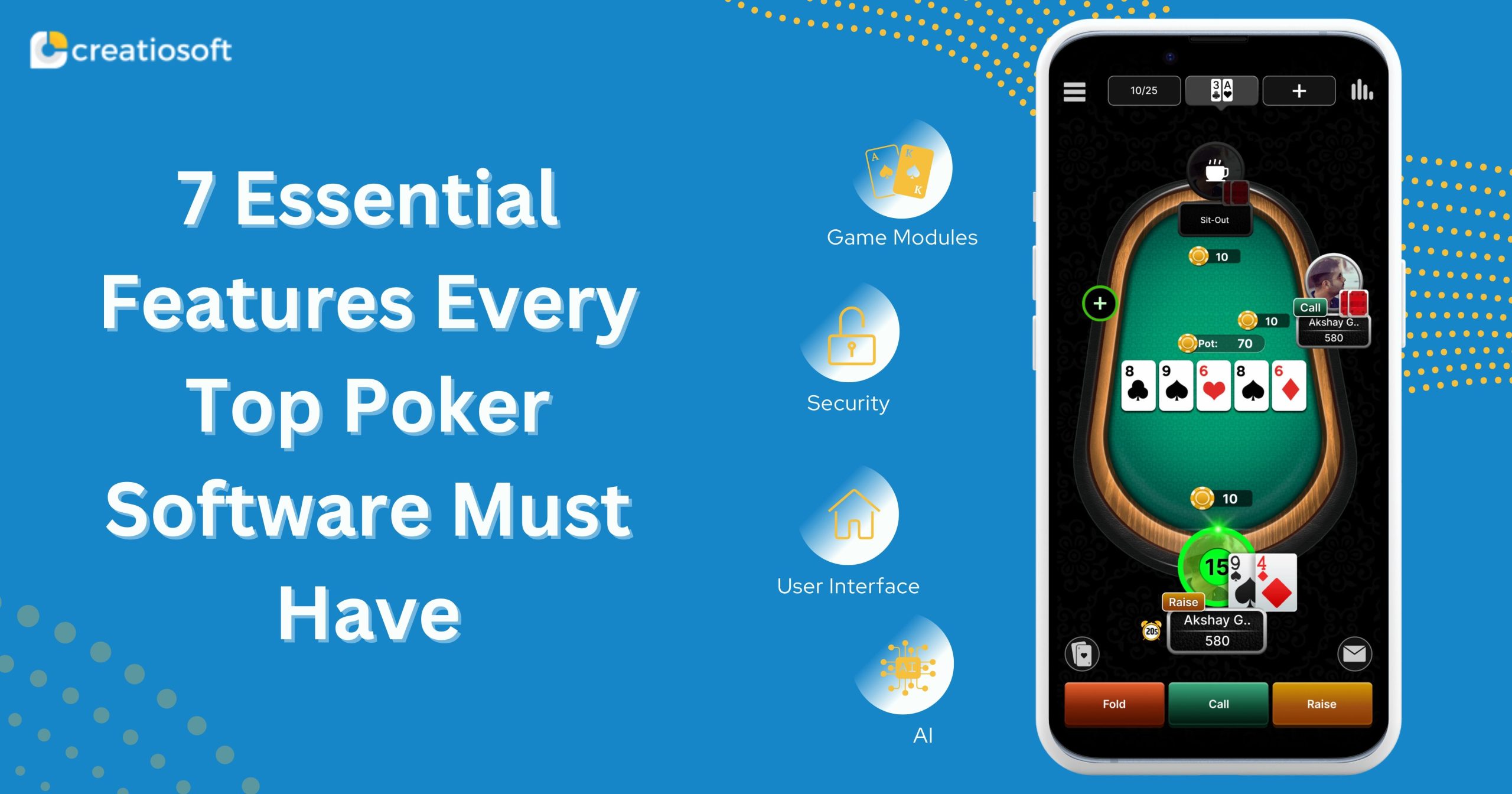Online poker gaming has become a lucrative and highly competitive industry. To launch and operate a successful online poker platform, you must offer an exceptional gaming experience to poker communities. With poker players logging in daily to test their skills and enjoy this skill-based game, there are certain must-have poker software features that your poker platform needs to offer! And in this blog, we will be discussing what these features are and how they help boost an online poker platform’s success.
Top 7 Essential Features of Poker Software
1. Customizable Game Modules
An online poker platform should be able to host a diverse range of poker players. Poker platforms that host a number of different game models and types always receive the most footfall. Apart from the different types of poker games — cash games, tournaments, and poker game variants — Texas holdem, Omaha, 7 Studs, etc., the poker platform should also have different modules.
– Club-Based Poker
This feature gives club owners the ability to create exclusive private clubs, club unions, invite members and approve them for participation. Owners, Managers and Agents can manage the clubs, host private cash games or tournaments. With customizable rules and seamless functionality, this module ensures a premium gaming experience for exclusive poker communities.
See in detail: What Makes the Club Poker Model So Popular Today?
– B2C Public Hosting
This module enables players to join public poker rooms that have been set up and monitored by admins. It’s the perfect choice for poker platforms aiming to expand their player base quickly and enhance engagement with a diverse poker community.
– Private Hosting
This model supports the creation of exclusive private games and tournaments, offering flexibility for the hosts to design, customize, and manage games for selected poker players. Poker players can be sent access by sending exclusive invites. This type of hosting model is a big hit among poker players who wish to engage in friendly matches with friends and acquaintances.
– Hybrid Hosting
Combining the best of club-based, public, and/or private hosting, this module allows poker players of all types to engage in games of their choice.
2. User Interface (UI) and Experience (UX)
A poker platform’s success heavily relies on its design and usability. A seamless UI/UX ensures that poker players can navigate the poker platform easily and focus on their gameplay.
– Intuitive Navigation:
An easy to navigate and well-organized poker platform makes it easy for poker players to find games, tournaments and events. Poker application features like intuitive menus and easily accessible filters enhance user satisfaction.
– Responsive Design:
Poker platforms must work flawlessly across multiple devices. Cross compatibility across different devices such as desktops, tablets, mobiles, PCs, along with accessibility through browsers, iOS, Mac, Android and Windows helps attract poker players. Responsive design ensures poker players enjoy consistent gameplay, regardless of the screen size.
– Customizable Themes:
Allowing poker players to personalize their gaming environment heightens the overall engagement. Offering choice of modes, themes, table skins, etc. can make a significant difference. It also encourages the poker players to customize eah individual game.
– Quick Load Times:
Poker players value speed, especially when they take part in time-sensitive tournaments. Optimized software that minimizes loading times enhances the overall experience and keeps poker players engaged.
Also Read: UI/UX in Poker Software
3. Real-Time Multi-Table Support
Poker communities often play at multiple tables simultaneously. Real-time multi-table support is thus crucial for any competitive platform.
– Effortless Switching:
Poker players should be able to toggle between tables without disrupting gameplay. Smooth transitions between poker tables improve focus and engagement.
– Custom Alerts and Notifications:
Alerts for critical actions, such as when it’s a player’s turn or a table is about to start, help players stay on top of multiple games.
– Scalability:
A reliable poker software must maintain performance even when there is a heavy volume of poker players, ensuring no lags or crashes are encountered during gameplay.
4. Secure Payment Gateways and Integrated Wallets
A trustworthy poker platform must prioritize secure transactions above everything else! Poker players need assurance that their transactions are protected.
– Multiple Payment Options:
Support for various payment methods, including:
- Credit/debit cards
- E-wallets (e.g., PayPal, Skrill)
- Cryptocurrencies (e.g., Bitcoin, Ethereum)
– Data Encryption and Fraud Prevention:
Advanced encryption protocols ensure data security. Anti-fraud systems prevent unauthorized transactions, maintaining the platform’s integrity.
5. Advanced Anti-Cheating Mechanisms
Fair play is the ultimate goal of online poker platforms. Implementing robust anti-cheating measurements ensures all players enjoy a level playing field and no one gets any unfair advantage.
– Collusion Detection:
One of the most important poker software features algorithms that should be integrated is to monitor player behavior and identify suspicious patterns, such as coordinated actions or chip dumping. This is a must-have feature that should be in your poker platform to guarantee fairplay.
– Bot Prevention:
Automated systems can detect and block the use of AI bots, preserving the competitive nature of poker games.
– Identity Verification:
Requiring poker players to verify their identities through KYC procedures, helps eliminate fake accounts and maintains the poker platform’s integrity.
6. Customizable Game and Tournament Rules
Customization is key to creating a unique poker platform experience. Allowing admins, club owners, agents, and affiliates to tailor poker game and tournament rules ensures they can cater to their target audience effectively!
– Adjustable Stakes and Blind Levels:
Admins can set minimum and maximum stakes or modify blind progression for tournaments, catering to players of varying skill levels.
– A Variety of Game Formats:
Introducing creative variations of poker tournaments, such as knockout tournaments, bounty tournaments, sit n gos, etc. adds excitement and attracts diverse players.
– Dynamic Scheduling:
Poker tournaments and game scheduling options suit poker player demographics better and optimize participation rates.
– Custom Lobby Layouts:
Club owners and admins can design poker lobbies that highlight featured tournaments or cash games, ensuring better visibility for important events.
7. Hand2Note Integration
Hand2Note, a specialized poker tracking software, provides advanced analytics and real-time data for poker players during their games. This integration enhances gameplay by delivering crucial information about opponents’ tendencies, strategies, and statistics directly within the game interface.
– Real-Time Statistics:
Hand2Note collects and displays live data on opponents, such as:
- Pre-flop raising percentages.
- Post-flop aggression levels.
- Win rates in specific scenarios.
– Advanced Hand Analysis:
Hand2Note enables poker players to review hand histories and identify patterns, mistakes, or opportunities to refine their strategies. This is the ultimate tool for self-analysis.
– Population Statistics:
In addition to individual player data, Hand2Note provides statistics on the general poker player base’s behavior. This is particularly useful for understanding trends in anonymous tables and proves invaluable for admins managing the platform.
To Sum it Up
Building a successful online poker platform requires more than just offering a few games. To stand out in this competitive space, your poker platform must integrate essential features that enhance user experience, ensure security, and provide flexibility. These features are not just desirable; they are critical for meeting the ever-evolving demands of the online poker industry. Platforms that prioritize these elements are well-positioned to deliver engaging and trustworthy poker experiences, building a loyal player base and achieving sustained growth.









